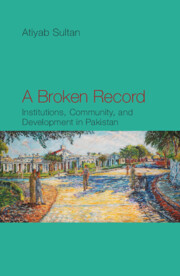Book contents
- Frontmatter
- Contents
- List of Figures
- List of Tables
- Preface
- Acknowledgements
- Introduction: Institutions, Debt, and the Deadweight of History, Punjab c. 1900–47
- 1 Glass Half Full?: Two Views of the Punjab
- 2 An Alternative Economic History of the Punjab
- 3 Combating Indebtedness I: Laws and Institutions
- 4 Combating Indebtedness II: Community Development in Colonial Punjab
- 5 The Bureaucrat’s Burden: Tales of Reform and Development
- 6 Colonialism and the Discourse on Development
- Postscript
- Glossary
- Bibliography
- Index
Postscript
Published online by Cambridge University Press: 27 September 2022
- Frontmatter
- Contents
- List of Figures
- List of Tables
- Preface
- Acknowledgements
- Introduction: Institutions, Debt, and the Deadweight of History, Punjab c. 1900–47
- 1 Glass Half Full?: Two Views of the Punjab
- 2 An Alternative Economic History of the Punjab
- 3 Combating Indebtedness I: Laws and Institutions
- 4 Combating Indebtedness II: Community Development in Colonial Punjab
- 5 The Bureaucrat’s Burden: Tales of Reform and Development
- 6 Colonialism and the Discourse on Development
- Postscript
- Glossary
- Bibliography
- Index
Summary
To those new states whom we welcome to the ranks of the free, we pledge our word that one form of colonial control shall not have passed away merely to be replaced by a far more iron tyranny … to those people in the huts and villages of half the globe struggling to break the bonds of mass misery, we pledge our best efforts to help them help themselves, for whatever period is required – not because the communists may be doing it, not because we seek their votes but because it is right. If a free society cannot help the many who are poor, it cannot the few who are rich. To our sister republics south of our border we offer a special pledge – to convert our good words into good deeds – in a new alliance for progress – to assist free men and free governments in casting off the chains of poverty.
—President John F. Kennedy, inaugural address, 20 January 1961Ideas of rural reconstruction or cooperation did not pass away with colonial rule but endured in South Asia under new nomenclature and frameworks. This postscript discusses the legacy of British policies of development in the Punjab, even though the lineage is marked by a discontinuity: while programmes of community developed and funded by the Americans took root in both India and Pakistan from the 1950s onwards, there was little recognition of the earlier colonial flirtation with similar ideas. Instead, community development was presented as a novel way of eradicating ‘third world poverty’ and continues to be recast in various deifications of the local as an ‘innovative’ cure for underdevelopment. This ahistorical persistence of ideas of community is neither accidental nor benign: at the heart of all valorization of ‘grassroots’ development is an abdication of responsibility at the structural level and a transfer of blame to the poor. Much like the colonial schemes of rural uplift, the community development programmes are also premised on self-help and a fundamental criticism of the outlook and habits of the peasant or citizen as the root cause of indebtedness or poverty.
Both India and Pakistan embarked on large-scale community development programmes in the 1950s and 1960s, with the financial support of the United States.
- Type
- Chapter
- Information
- A Broken RecordInstitutions, Community and Development in Pakistan, pp. 192 - 208Publisher: Cambridge University PressPrint publication year: 2022



